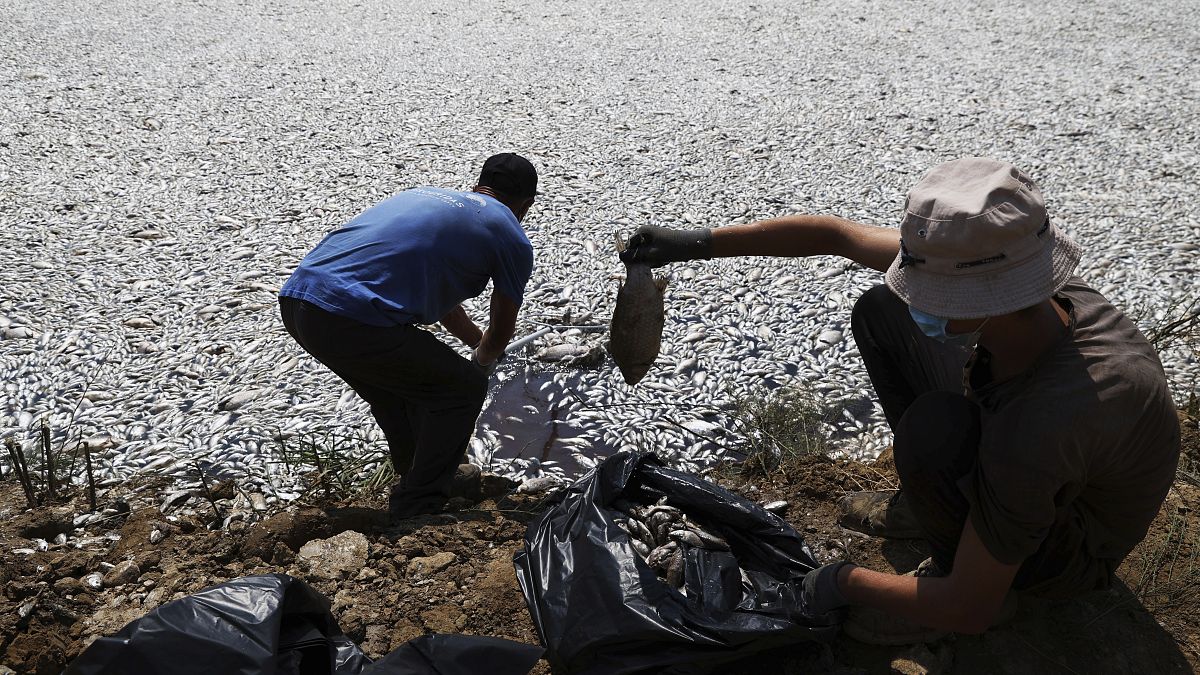The central Greek port of Volos is facing a devastating environmental crisis as more than 100 tonnes of dead freshwater fish have washed into the bay and nearby rivers. The mass deaths have been attributed to extreme climate fluctuations, with the fish being displaced from their normal habitats by flooding followed by severe drought. The authorities in the region have sprung into action by chartering fishing trawlers and earthmovers to remove the dead fish from the water and transport them to an incinerator. This phenomenon has prompted the declaration of a state of emergency by the regional governor, highlighting the seriousness of the situation.
Lake Karla in central Greece, which had been drained in the 1960s and restored in 2018 to combat drought effects, served as the source of the dead fish. The abrupt rise in water levels due to a deadly storm last autumn led to extensive flooding in the region, only to be followed by low rainfall and heatwaves in the subsequent months. Experts believe that the absence of a net at the mouth of the river leading into Volos allowed the freshwater fish to be carried with the floodwater and ultimately succumb to the seawater. The lack of preventive measures has drawn criticism from various quarters, with the mayor of Volos expressing dissatisfaction with the slow response of the regional authority.
The foul odor emanating from the rotting fish has not only posed environmental concerns but has also impacted the economy of Volos, particularly its tourism sector. The Chamber of Commerce in the city has reported an estimated 80% drop in commercial activity over the last three days, with businesses along the seafront, especially in the catering industry, suspending operations due to the repulsive stench. The situation has raised fears of an environmental disaster, prompting calls for immediate action to mitigate the damage caused by the dead fish. The mayor’s plea for assistance in addressing the crisis underscores the urgency of the matter and the need for a coordinated effort to restore normalcy in the affected areas.
As the cleanup efforts continue in Volos, there is a growing sense of urgency to address the root causes of the fish deaths and implement measures to prevent similar incidents in the future. The combination of extreme weather events, including flooding and drought, has highlighted the vulnerability of freshwater fish populations and the ecosystems they inhabit. Collaborative initiatives between government agencies, local communities, and environmental organizations will be crucial in finding sustainable solutions to mitigate the impact of climate change on freshwater habitats. By raising awareness about the interconnectedness of environmental, social, and economic factors, stakeholders can work together to safeguard the health of ecosystems and promote resilience in the face of environmental challenges.
In the wake of the dead fish phenomenon in Volos, there is a pressing need to prioritize environmental protection and sustainable resource management to prevent further ecological crises. The incident serves as a stark reminder of the fragile balance between human activities and natural ecosystems, underscoring the importance of responsible stewardship of the environment. By adopting a holistic approach that integrates conservation efforts with sustainable development goals, communities can build resilience in the face of climate-related challenges and safeguard the wellbeing of present and future generations. The cleanup and recovery process in Volos offers an opportunity to learn from past mistakes and implement proactive measures to protect freshwater habitats and their inhabitants from the impacts of climate change.
In conclusion, the dead fish crisis in Volos underscores the urgent need for coordinated action to address the consequences of extreme climate fluctuations on freshwater ecosystems. By taking swift and decisive steps to clean up the affected areas, implement preventive measures, and engage stakeholders in environmental conservation efforts, communities can mitigate the impact of environmental disasters and promote sustainable development. The lessons learned from this unfortunate incident can inform future decision-making processes and inspire collective action to build resilience in the face of environmental challenges. As Volos grapples with the aftermath of the dead fish phenomenon, it is imperative to prioritize environmental sustainability and establish mechanisms for effective disaster response and recovery. Only through a concerted effort to protect and preserve our natural resources can we ensure a healthy and thriving environment for current and future generations.











